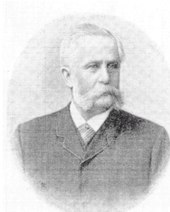Eugen Buhl
Eugen Ritter von Buhl (born July 20, 1841 in Deidesheim , † April 12, 1910 in Munich ) was a Bavarian politician and winemaker.
family
Buhl was a son of the German politician Franz Peter Buhl (1809–1862) and his wife Josefine, née Jordan (1813–1872), a daughter of Deidesheim's mayor Andreas Jordan . Buhl had two brothers, Franz Armand (1837-1896) and Heinrich (1848-1907). Buhl was unmarried and had no children. His nephew Franz Eberhard Buhl inherited his share in Buhl's property .
Life
After Buhl had attended grammar school in Mannheim , he studied natural sciences in Heidelberg and Munich from 1858 to 1862 . In the Franco-Prussian War in 1870 he took part in the campaign with the 6th Bavarian Chevauleger Regiment . From 1875 to 1896 he was regularly elected to the Bavarian Chamber of Deputies in the district of Landstuhl / Pfz ; here he represented the interests of agriculture and viticulture, but was also a member of the finance committee.
The Bavarian Prince Regent Luitpold awarded Buhl the Knight's Cross of the Order of Merit of the Bavarian Crown in 1894, which was associated with a personal nobility . After the death of his brother Franz Armand, Buhl was appointed Reichsrat of the Bavarian Crown for life on March 17, 1896 , which is why he had to resign from the Chamber of Deputies. His successor was Johannes Schmitt . In addition, Buhl was awarded the title of Excellence two years before his death .
Like his brother, Buhl was also a supervisory commissioner for the Palatinate wine-growing region . In addition to his functions in politics and in the Buhlschen Weingut in Deidesheim, whose management he took over after the death of his brother, Buhl also held functions in the economic sector. Buhl was a member of the board of directors of the Pfalzbahn until it was nationalized in 1909, and of the Palatinate Hypothekenbank; He was also a member of the supervisory boards of companies such as the worsted spinning mill in Kaiserslautern , the cotton spinning mill in Lampertsmühle , the Portland cement plant in Heidelberg and the sugar factory in Frankenthal . Buhl was also a member of the Bavarian and German Agricultural Councils and the German Agricultural Society . In his hometown of Deidesheim, Buhl held a seat on the city council for many years.
Buhl died of a heart attack in his Munich apartment on April 12, 1910 and was buried four days later in Deidesheim.
Individual evidence
- ↑ a b c d e f g Joachim Kermann: Economic and social development 1816 to 1914 . In: Kurt Andermann , Berthold Schnabel (Ed.): Deidesheim - Contributions to the history and culture of a city in the wine country . Jan Thorbecke Verlag, Sigmaringen 1995, ISBN 3-7995-0418-4 , p. 251 f .
- ↑ a b House of Bavarian History: Dr. Eugen Ritter von Buhl . Retrieved December 4, 2016.
- ↑ a b c d House of Bavarian History: Buhl, Dr. Eugen Ritter from . Retrieved December 4, 2016.
- ↑ Messages from Rhineland-Palatinate and Saarland archives ( Memento from June 27, 2015 in the Internet Archive )
Remarks
- ↑ The House of Bavarian History named in the individual records mentions April 28, 1910 as the date of Buhl's death. Joachim Kermann named in the individual records, who refers to published obituaries, and the epitaph in Buhl's grave in Deidesheim name April 12th.
| personal data | |
|---|---|
| SURNAME | Buhl, Eugene |
| ALTERNATIVE NAMES | Buhl, Eugen Ritter von |
| BRIEF DESCRIPTION | Bavarian politician and winemaker in Deidesheim |
| DATE OF BIRTH | July 20, 1841 |
| PLACE OF BIRTH | Deidesheim |
| DATE OF DEATH | April 12, 1910 |
| Place of death | Munich |
